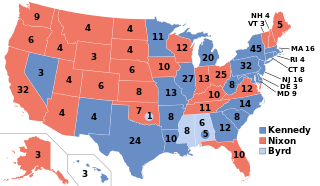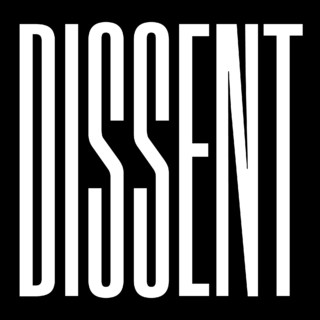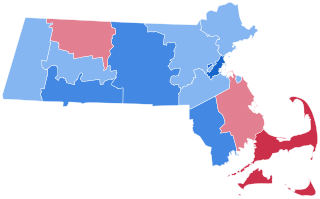
The 1960 United States presidential election was the 44th quadrennial presidential election, held on Tuesday, November 8, 1960. In a closely contested election, Democratic Senator John F. Kennedy defeated the incumbent Republican Vice President Richard Nixon. This was the first election in which 50 states participated, marking the first participation of Alaska and Hawaii, and the last in which the District of Columbia did not. This made it the only presidential election where the threshold for victory was 269 electoral votes. It was also the first election in which an incumbent president—in this case, Dwight D. Eisenhower—was ineligible to run for a third term because of the term limits established by the 22nd Amendment.

The 1964 United States presidential election was the 45th quadrennial presidential election. It was held on Tuesday, November 3, 1964. Incumbent Democratic President Lyndon B. Johnson defeated Republican Senator Barry Goldwater in a landslide victory. Johnson was the fourth and most recent vice president to succeed the presidency following the death of his predecessor and win a full term in his own right. Johnson won the largest share of the popular vote for the Democratic Party in history, 61.1%, and the highest for any candidate since the advent of widespread popular elections in 1824.

The 1968 United States presidential election was the 46th quadrennial presidential election, held on Tuesday, November 5, 1968. The Republican nominee, former vice president Richard Nixon, defeated both the Democratic nominee, incumbent vice president Hubert Humphrey, and the American Independent Party nominee, former Alabama governor George Wallace. This was the last election until 1988 in which the incumbent president was not on the ballot. This is the most recent election where a third-party candidate won a state.

Lyndon Baines Johnson, often referred to by his initials LBJ, was an American politician who served as the 36th president of the United States from 1963 to 1969. He became president after the assassination of John F. Kennedy, under whom he had served as the 37th vice president from 1961 to 1963. A Democrat from Texas, Johnson also served as a U.S. representative and U.S. senator.

The Socialist Party of America (SPA) was a socialist political party in the United States formed in 1901 by a merger between the three-year-old Social Democratic Party of America and disaffected elements of the Socialist Labor Party of America who had split from the main organization in 1899.

Social Democrats, USA (SDUSA) is a social-democratic organization established in 1972 as the successor of the Socialist Party of America (SPA). The SPA had stopped running independent presidential candidates and consequently the term "party" in its name had confused the public. Moreover, replacing the "socialist" label with "social democrats" was meant to disassociate the group from the Soviet Union.

Dissent is an American Left intellectual magazine founded in 1954. It is published by the University of Pennsylvania Press on behalf of the Foundation for the Study of Independent Social Ideas and is currently edited by Natasha Lewis and Timothy Shenk. Former co-editors include Irving Howe, Mitchell Cohen, Michael Walzer, and David Marcus.
The history of the socialist movement in the United States spans a variety of tendencies, including anarchists, communists, democratic socialists, social democrats, Marxists, Marxist–Leninists, Trotskyists and utopian socialists. It began with utopian communities in the early 19th century such as the Shakers, the activist visionary Josiah Warren and intentional communities inspired by Charles Fourier. Labor activists, usually Jewish, German, or Finnish immigrants, founded the Socialist Labor Party of America in 1877. The Socialist Party of America was established in 1901. By that time, anarchism also rose to prominence around the country. Socialists of different tendencies were involved in early American labor organizations and struggles. These reached a high point in the Haymarket massacre in Chicago, which founded the International Workers' Day as the main labour holiday around the world, Labor Day and making the eight-hour day a worldwide objective by workers organizations and socialist parties worldwide.

The 1960 Democratic National Convention was held in Los Angeles, California, on July 11–15, 1960. It nominated Senator John F. Kennedy of Massachusetts for president and Senate Majority Leader Lyndon B. Johnson of Texas for vice president.
Dwight Macdonald was an American writer, critic, philosopher, and activist. Macdonald was a member of the New York Intellectuals and editor of their leftist magazine Partisan Review for six years. He also contributed to other New York publications including Time, The New Yorker, The New York Review of Books, and Politics, a journal which he founded in 1944.
The Democratic Socialist Federation was founded by members of the Social Democratic Federation who had opposed the latter's 1956 reunification with the Socialist Party of America in 1956.

Maurice Isserman, formerly William R. Kenan and the James L. Ferguson chairs, is a Professor of History at Hamilton College. He has written about the Communist Party USA during the Popular Front period of the 1930s and 1940s, as well as the emergence of the New Left and the 1960s. He co-authored a biography with Dorothy Ray Healey and authored a biography of Michael Harrington, both of whom were co-founders of Democratic Socialists of America. He has contributed editorials and book reviews to The New York Times, The Boston Globe, Newsday, the Los Angeles Times, The Nation, and The American Alpine Review. In 2008, he began writing about mountaineering.
Bogdan Denitch was an American sociologist of Serb origin. He was a leading authority on the political sociology of the former Yugoslavia, and served as professor at the Queens College, City University of New York (CUNY) from 1973 until his retirement in 1994. Denitch was active in democratic left politics throughout his life, joining the Young People's Socialist League at age 18, and later co-founding the Democratic Socialists of America. From 1983 through 2004 he organized the annual Socialist Scholars Conference in New York. Beginning in the 1990s he was an advocate for human rights and an opponent of nationalism in the former Yugoslavia.
The American Left can refer to multiple concepts. It is sometimes used as a shorthand for groups aligned with the Democratic Party. At other times, it refers to groups that have sought egalitarian changes in the economic, political, and cultural institutions of the United States. Various subgroups with a national scope are active. Liberals and progressives believe that equality can be accommodated into existing capitalist structures, but they differ in their criticism of capitalism and on the extent of reform and the welfare state. Anarchists, communists, and socialists with international imperatives are also present within this macro-movement. Many communes and egalitarian communities have existed in the United States as a sub-category of the broader intentional community movement, some of which were based on utopian socialist ideals. The left has been involved in both the Democratic and Republican parties at different times, having originated in the Democratic-Republican Party as opposed to the Federalist Party.

Tom David Kahn was an American social democrat known for his leadership in several organizations. He was an activist and influential strategist in the Civil Rights Movement. He was a senior adviser and leader in the U.S. labor movement.
The 2012 presidential campaign of Stewart Alexander war formed soon after the 2008 presidential election. Alexander, who had previously campaigned for the Socialist Party USA nomination in 2008 and served as their Vice Presidential nominee, selected Alejandro Mendoza as his running mate. He was often discussed as a potential candidate for the 2012 Socialist Party USA presidential nomination.

Edward Michael Harrington Jr. was an American democratic socialist. As a writer, he was best known as the author of The Other America. Harrington was also a political activist, theorist, professor of political science, and radio commentator. He was a founding member of the Democratic Socialists of America, and its most influential early leader.

The 1960 United States presidential election in Massachusetts took place on November 8, 1960, as part of the 1960 United States presidential election, which was held throughout all 50 states. Voters chose 16 representatives, or electors to the Electoral College, who voted for president and vice president.
The New Left was a broad political movement that emerged from the counterculture of the 1960s and continued through the 1970s. It consisted of activists in the Western world who campaigned for a broad range of social issues such as feminism, gay rights, drug policy reforms and the rejection of traditional family values, social order, and gender roles. The New Left differs from the traditional left in that it tended to acknowledge the struggle for various forms of social justice, whereas previous movements prioritized explicitly economic goals. However, many have used the term "New Left" to describe an evolution, continuation, and revitalization of traditional leftist goals.
The history of left-wing politics in the United States consists of a broad range of individuals and groups that have sought fundamental egalitarian changes. Left-wing activists in the United States have been credited with advancing social change on issues such as labor and civil rights as well as providing critiques of capitalism.












